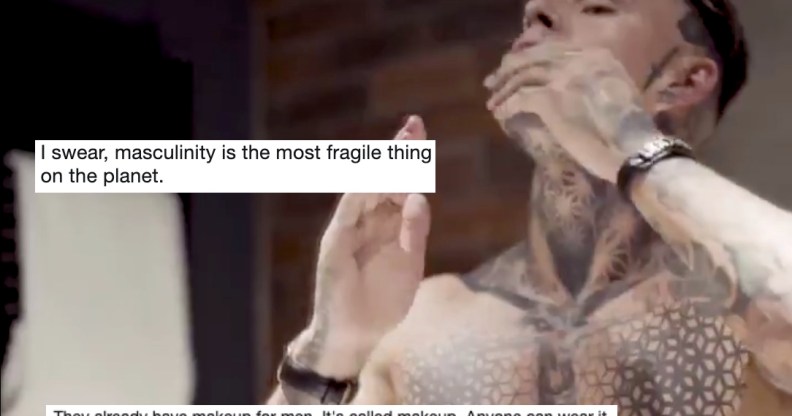Twitter users are roasting War Paint, a make-up brand ‘specifically for men’

War Paint, a make-up brand “for men,” is being roasted on Twitter. (warpaintmufm/Twitter)
Twitter users have found out about War Paint, a “makeup brand formulated specifically for men’s skin” and they have opinions.
The brand, called War Paint—Makeup for Men, posted a 13-second ad on their Twitter on Wednesday (May 8).
“We couldn’t find a makeup brand formulated specifically for men’s skin; so we created one,” the caption read.
The post has gathered more than 3,000 replies and likes since it was published and the account has grown its Twitter following to over 1,000 users.
The video, which showed a muscular man covered in tattoos using the products, received more than 3.5 million views.
What is the controversy about?
The reactions to the brand and its products were however mostly negative, with several Twitter users accusing War Paint of perpetrating a certain vision of masculinity predicated on violence and macho stereotypes, while others pointed out that the limited range of shades in the War Paint products effectively excluded men with dark skin tones from potentially using the products.
“I do want to say, a lot of men who like makeup aren’t the Axe body spray circa 2000s type, hope to see your comms explore other flavors of masculinity,” one Twitter user wrote.
War Paint answered to that post, writing: “I agree, if you look at our reviews you will see men from 16 to 75 using our products and loving them. If females can have products just for women, why can’t men? Our aim is to allow makeup to be gender neutral and to do that we must have male specific brands also.”

The make-up brand War Paint invited further controversy with its use of the word “females.” (warpaintmufm/Twitter)
But the use of the word “females” in the post, as well as the use of the oxymoronic terms “gender neutral” and “male specific” attracted more controversy.
“1. Women, not ‘females.’ 2. Makeup *is* gender neutral, creating a men-only brand doesn’t solve that. 3. Why do you have to market your product using aggressive, violent language?” one Twitter user reacted, summarising three of the main critiques facing the brand.
“War Paint actually came from my own struggles. It’s about understanding that not all men have that confidence.”
— Daniel Gray
Another Twitter user pointed out to the popularity of several male makeup artists such as Jeffree Star and James Charles: “No make up product says on the package that it’s only for women. Yes most of the time it is advertised by female models but so many male youtubers now have brand deals so I think make up is already gender neutral. This whole ad shouts ‘fragile masculinity.'”
“Right like if it helps dudes that are uncomfortable with buying current makeup brands then awesome! But saying its ‘for men’ is trash imo. What about women that dont feel comfortable with feminity and normal makeup brands? Or anyone that struggles with makeup for that reason.”

Some of the criticism men-specific make-up brand War Paint is receiving on Twitter. (warpaintmufm/Twitter)
The men-specific focus of the brand also alienated some transgender and gender non-binary Twitter users. One person wrote: “As a non-binary individual, I can’t decide whether to hit you up and make this product a reality and make us some fat cashhh, or advocate for men to pull their head out of their ass and buy normal makeup without hurting their delicate masculinity.”
PinkNews contacted War Paint for comment.
War Paint founder says he wasn’t ‘comfortable’ buying other makeup brands
The brand posted a video on Friday (May 10) on Twitter featuring its founder Daniel Gray explaining his motivation for starting the brand, but avoiding to address any of the criticism.
In the video, Gray said he was bullied at school for the way he looked and a result he suffers from body dysmorphia. He said he created War Paint because he had not found a brand he felt comfortable buying.
“This is why I created the brand War Paint—something I’d feel confident in wearing. It’s not perfect yet, but I’m working on it. So look, for me this was never about making money, War Paint actually came from my own struggles. It’s about understanding that not all men have that confidence. I didn’t, and I struggled.”
The reactions to the video so far suggest it has failed to quell the controversy. “How to use feelings to justify making money on toxic masculinty [sic],” one user commented.

